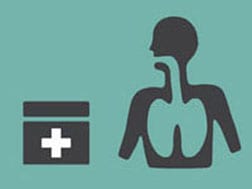Healthcare Respiratory Protection Resources
Medical Evaluation for Respirator Wearers
NIOSH Documents
Hospital Respiratory Protection Program Toolkit
This toolkit was developed to assist hospitals in developing and implementing effective respiratory protection programs, with an emphasis on preventing the transmission of aerosol transmissible diseases (ATDs) to healthcare personnel.
Healthcare personnel are paid and unpaid persons who provide patient care in a healthcare setting or support the delivery of healthcare by providing clerical, dietary, housekeeping, engineering, security, or maintenance services. Healthcare personnel may potentially be exposed to ATD pathogens. Aerosols are particles or droplets suspended in air. ATDs are diseases transmitted when infectious agents, which are suspended or present in particles or droplets, contact the mucous membranes or are inhaled.
Implementing Hospital Respiratory Protection Programs: Strategies from the Field
Protecting workers from exposure to all types of respiratory hazards is an important issue for hospitals and other healthcare organizations. In order to address this often overlooked danger, The Joint Commission and Centers for Disease Control and Prevention (CDC), National Institute for Occupational Safety and Health (NIOSH), National Personal Protective Technology Laboratory (NPPTL) have collaborated to develop a new educational monograph designed to assist hospitals in implementing their respiratory protection programs (RPPs).
Blogs
N95 Respirator Use during Pregnancy – Findings from Recent NIOSH Research
Recent NIOSH research has shed some light on the topic of the safety of N95 filtering facepiece respirators (FFR) use by pregnant workers.
Heat Stress Imposed by PPE Worn in Hot and Humid Environments
Heat stress is a potential stress factor that healthcare workers (HCWs) who use personal protective equipment (PPE) and their employers should be aware of in order to recognize the signs and be prepared with the knowledge of how to alleviate the burden.
The Physiological Burden of Prolonged PPE Use on Healthcare Workers during Long Shifts
Particular features of PPE can impose a physiological (how the body normally functions) burden on HCWs which can be exacerbated by long work hours without adequate breaks for eating, hydration and self-care.
Skin Irritation from Prolonged Use of Tight-Fitting Respirators
Respiratory protection program managers, healthcare providers, and end users should understand how proper respirator fit and use can decrease skin irritation, as well as how to treat potential skin irritation caused by extended respirator use.
Videos
N95 Respirator Use During Advanced Pregnancy
NIOSH researcher Dr. Raymond Roberge describes his research on the topic of the safety of N95 filtering facepiece respirators (FFR) use by pregnant workers.
Medical Evaluation for Workers Who Use Respirators
Journal Articles
N95 respirator use during advanced pregnancy
Roberge RJ, Kim J-H, Powell JB. [2014]
American Journal of Infection Control 42: 1097-1100.
Effect of external airflow resistive load on postural and exercise-associated cardiovascular and pulmonary responses in pregnancy
Kim J-H, Roberge RJ, Powell JB. [2015]
BMC Pregnancy and Childbirth 2015; 15: 45-52.
Absence of consequential changes in physiological, thermal and subjective responses from wearing a surgical mask
Roberge RJ, Kim J-H, Benson SM. [2012]
Respiratory Physiology & Neurobiology 181: 29-35.
Protective facemask impact on human thermoregulation: an overview
Roberge-RJ; Kim-J-H; Coca-A
Ann Occup Hyg 2012 Jan; 56(1):102-112
